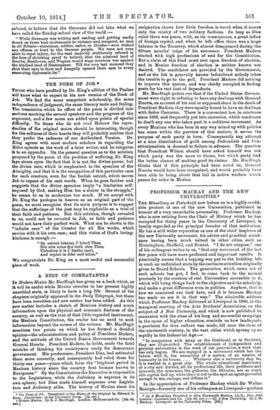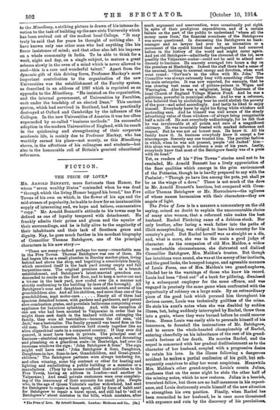PROFESSOR MACKAY AND THE YEW UNIVERSITIES.* THE Miscellany or Festschrift
now before us is a highly credit- able product of one of the new Universities, published in
honour of a very remarkable personality. Professor Mackay, who is now retiring from the Chair of History which he has occupied for thirty years in the University of Liverpool, is locally regarded as the principal founder of that institution. He has a still wider reputation as one of the chief inspirers of the new University movement, his advice and practical assist- ance having been much valued in other cities, such as Birmingham, Sheffield, and Bristol. "I do not suppose," one of his colleagues writes to us, "that any movement of the last few years will hare more profound and important results. It practically means that a topping was put to the building left in such an unfinished state by the exclusive attention originally given to Board Schools. The generation which came out of such schools has got, I feel, to come back to the normal precisely by the creation of real Universities accessible to it, which will bring things back to the objective and the scholarly, and make a great difference even in politics. Anyhow, that is how we conceived our task here, and it is because Mackay has made us see it in that way." The admirable address which Professor Mackay delivered at Liverpool in 1900, at the inaugural meeting of the Arts Students' Association, on the
subject of A New University, and which is now published in connexion with the close of his long and successful campaign
in the cause of higher education, reminds us how inadequate a provision for true culture was made, till near the close of the nineteenth century, in the vast cities which sprang up so rapidly in the Industrial Age:—
"In comparison with many on the Continent, or in Scotland, they are ill-provided. The establishment of independent and genuine universities is the work of our generation, a work that has only begun. We aro engaged in a movement which has the future with it, the necessities of a nation, of an empire, of humanity in its bosom. . . . Whatever else a university may be, it is wanted in a great city. The whole educational machinery of a city and district, all its professional life, their problems and interests, the museums, the galleries, the libraries, are so much idle capital tied up, when there is not on the spot an agent powerful enough to use, enlarge, and diffuse it."
In the appreciation of Professor Mackay which Sir Walter Raleigh—formerly one of his colleagues at Liverpool—prefixes
• (1) A Miscellany Presented to John Macdonald Mackay, LL.D., July, 1914. London: Constable and Co. [10s. 6d. net.]—(2) A Ness University. By J. /IL Mackay. Liverpool: at the University Press. [Sd.]
to the Miscellany, a striking picture is drawn of his intense de- votion to the task of building up the new civic University which has been evolved out of the modest local College. "It may truly be said that for years he thought of nothing else. I have known only one other man who had anything like his fierce insistence of mind; and that other also left his impress on a whole community in India. To be able to think for a week, night and day, on a single subject, to mature a great scheme slowly in the oven of a mind which is never allowed to cool—this is a rare and wonderful talent." Apart from the dynamic gift of this driving force, Professor Mackay's most important contribution to the organization of the new Universities was the establishment of the Faculty system, as described in an address of 1897 which is reprinted as an appendix to the Miscellany. "He insisted on the organization, and the internal government, of Universities by Faculties, each under the headship of an elected Dean." This ancient system, which had survived in Scotland, had been practically destroyed at Oxford and Cambridge by the influence of the Colleges. In the new Universities of America it was too often superseded by so-called " business methods." Its successful adoption in the modern Universities of England, with its result in the quickening and strengthening of their corporate academic life, is mainly due to Professor Mackay, who has worthily earned his place—not merely, as this Miscellany shows, in the affections of his colleagues and students—but also in the honourable roll of Britain's greatest educational reformers.



































 Previous page
Previous page